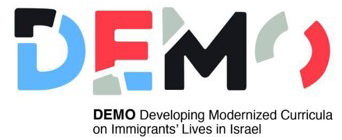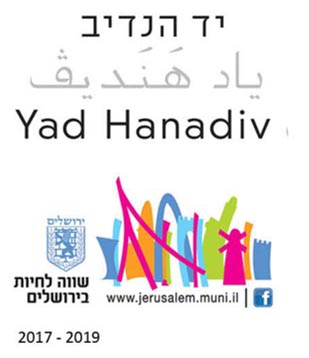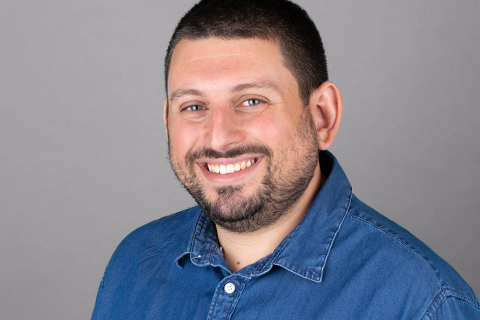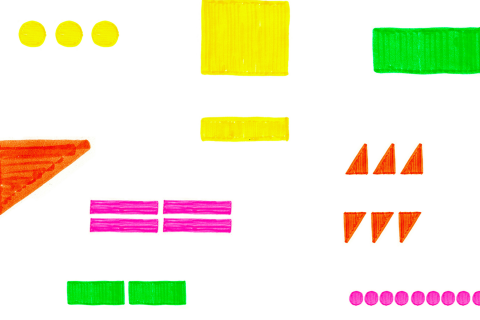רשות המחקר והחדשנות
مكتب الأبحاث والابتكار
Research & Innovation Authority
מחקרים פעילים
Developing Modernized Curricula on Immigrants'
and Refugees' Lives
The aim of DEMO.IL is to increase attention to migrants' lives in academic training in applied social professions such as teachers, counselors, social workers, psychologists in Israel; develop knowledge about migrants' lives and integrate their voices into study programs of these professions in HEIs and in the general social discourse. The aims we propose to achieve the development, implementation, and dissemination of innovative courses on the lives of migrants and refugees.
LINK: https://www.demo.erasmus-il.org/

סרטון על פרויקט DEMO
סרטון על פיתוח קורסים מבוססי יצירה ואמנות בנושא הגירה ועקירה
Creative Economy and Culture International link
The overall goal of the REACTIK project is to broaden the field of European integration studies by incorporating the domain of European Cultural Diplomacy (ECD) and European Culture Policy (ECP) in the research and activities of European Study Centers and Academies for Art and Design. The project will develop an inter-regional, collaborative academic space to enhance the study of ECD and ECP. The developments in European cultural policy in recent years, and after the EU published the joint declaration on EU strategy for international cultural relations in 2016 in particular, have set the stage for exploring European integration studies from a further social and economic perspective- that of cultural policy and practice.
As culture policy is bonded with economic growth, CP has a great influence on the so-called “creative economy”. Based on ideas rather than physical capital, the creative economy straddles economic, political, social, cultural issues and is at the crossroads of the arts, business and social forces. Hence, the REACTIK network aims to bring together scholars, designers, artists and students in order to mutually study the policies and influences of European activities within this area, both within and outside Europe.
Based upon state of the art research in EU studies, and thanks to the diversified combination of partners, the network wishes to globally raise academic awareness for this understudied domain and provide scholars and practitioners with tools and methodologies to better understand the EU as an international actor in the field. Through ongoing communication, research and dialogue, the REACTIK network wishes to work towards the establishment of a new sub-discipline within the EU studies: European Cultural Diplomacy research.
LINK: https://reactik.eu/
EU Marie Curie ITN program
The purpose of HERILAND is to educate a new generation scholars, policy makers, practitioners, professionals and entrepreneurs for transdisciplinary and sector transgressing planning of heritage and landscape. The aim is to find tools and approaches that enhance social inclusion while working for social, economic and culturally sustainable landscapes. The research school embraces academic institutions from seven countries and a large number of collaborators such as museums, heritage institutions, companies and authorities.
HERILAND has been awarded 40 million SEK (4 mil EUR) and will be coordinated by CLUE+ at VU Amsterdam. Under this framework Bezalel Academy will provide academic advisory for 2 international PhD Students for 3 years.
LINK: https://www.heriland.eu/
White-stone Research
White stone cladding characterizes the architecture of the city of Jerusalem. Dating back to the governorship of Sir Ronald Storrs during the British Mandate, and a master plan for the city drawn up in 1918 by Sir William McLean, municipal laws in Jerusalem require that all building be faced with local Jerusalem stone. Recent master and policy plans indicate that the city will change its face in the coming decades. Plans for high-density, multi-story, tall construction for public buildings are much more advanced today than in the past, and this trend will increase. The need for professional and public discussion about construction in stone in these cases is urgent and significant.
The Bezalel School of Art, Design and Architecture promotes practical research which directly influences daily life and public discourse. The request is for support towards a professional and public discussion of construction in stone in Jerusalem in multi-story and major public buildings, via two research groups comprising leading professionals, and an open process of public response. At the end of the process, the research will be submitted and professional recommendations will be made. The research groups will be organised by architects practicing in Jerusalem and will include leading architects from Israel and abroad. The process will be coordinated by the Planning Director of the Jerusalem Municipality, through the Jerusalem Urban Design Centre, directed by the City Architect.
Israel 100
The integrated project Israel 100 is a combined effort of academic and professional planning bodies which intends to develop strategic thinking (which may eventually lead to a strategic plan) towards the future planning of Israel. This is done in response to two earlier such strategic planning processes: Israel 2020, a comprehensive planning research enterprise published in 1996, and TAMA 35 – an Integrated National Master Plan for Construction, Development and Preservation for Israel, approved in 2005 (the previous one, TAMA 31 was approved in 1993).
The present endeavour was devised to deal with many great challenges facing Israel in the present and which will be increasing immensely in the future decades, including, first and foremost, the doubling of the number of population and the building and infrastructure. This increase is calculated to be about fourfold of the rate of development in Israel to date. The project thus combines strategic themes, such as future scenarios for Israel’s development, Israeli built Utopias and Red Lines for planning, with more practical themes such as accessibility, social changes, technology and public participation. One of the major goals, which also sets our project apart from previous ones, is the aim to provide qualitative built environment, not only quantitative.
The main goal of Bezalel’s part in the project is to define and advance affordable urbanism: urbanism which will be not only of quality and of accessibility, but also within economic and social reach. In our analysis so far, we have been challenging texture typologies defined by TAMA 35 and Israel 2020, including the settled dichotomies between open and built areas. We are suggesting a different way to look at Israel’s built textures, identifying the main building typologies used throughout the short historical development of Israel’s open and built landscape. We will additionally be using an approach of strategic intervention in key urban areas on various scales.
פרויקט "בין הטיפות" - חשיבה מחודשת על תכנון ועיצוב תחנות לבריאות המשפחה
"בין הטיפות" הוא פרויקט משותף של המחלקה לארכיטקטורה בבצלאל עם משרד הבריאות וקרן ברנרד ון-ליר, במסגרתו נערכת חשיבה מחודשת על התכנון והעיצוב של התחנות לבריאות המשפחה – "טיפת חלב" – וסביבותיהן ברחבי הארץ. הפרויקט מתבסס על העקרונות של Urban95 – יוזמה בינלאומית לחשיבה מחודשת על תכנון ועיצוב העיר מתוך נקודת המבט של התושבים הצעירים שלה – אלה שגובהם הוא 95 ס"מ.
מטרת הפרויקט הינה גיבוש הנחיות כלל ארציות לעיצוב ותכנון שטחי פנים וחוץ של מרכזי טיפת חלב, תוך התאמה לצורכי קהילות ספציפיות בפריפריה, קבוצות מיעוט, קהילות דתיות וכדומה. האתגר העיצובי כולל התייחסות למרחבים פתוחים לציבור ולפונקציות תרבותיות במרכזי טיפות החלב ובשטחיהן, כך שישמשו מרחבים אורבניים איכותיים ומקדמים עבור ילדים בגיל הרך ומשפחותיהם.
במסגרת הפרויקט, תתקיים תחרות בינלאומית בין-תחומית המיועדת למעצבים צעירים ולסטודנטים. מטרת התחרות – שתיערך בהובלת בצלאל - לפתח ארגז כלים של עקרונות תכנון ליישום ארצי בטיפות החלב בישראל. התחרות תתבסס על מרכזי טיפות חלב שנבחרו על-ידי משרד הבריאות (קיימים ומתוכננים) ויהוו מודלים לתכנון ולעיצוב עבור המועמדים בתחרות. הזוכים יבחרו על-ידי צוות שיפוט שיורכב מגורמים מקצועיים, מקומיים ובינלאומיים, הן בתחום האדריכלות והתכנון והן בתחום התפתחות הגיל הרך, אשר הצעתם תשמש בסיס לבניית עקרונות תכנון שיושמו בשטח על-ידי משרד הבריאות.
השאלה העומדת בבסיס התחרות היא - כיצד ניתן לעצב מחדש את תחנות "טיפת חלב" באמצעות כלים עיצוביים ותכנוניים, הנעים מקנה מידה אורבני לקנה מידה של הפרט, כך שהן ישמשו סביבה פעילה לפעוטות ולמלוויהם, יעודדו בריאות והתפתחות לגיל הרך, יעשירו את האינטראקציה בין הילד למלווהו, ויחזקו את טיפת החלב כמוקד אורבני וקהילתי מזמין?
תכנית Urban95, שמובילה קרן ברנרד ון ליר, שואפת לסייע לאדריכלים, מעצבים ובעלי עניין אחרים להשפיע דרך עבודתם על האופן שבו משפחות וילדים בגיל הרך חיים, משחקים, מתקשרים ונעים בערים, ולהשפיע לחיוב על התנהגותם ועל רווחתם של הגורמים המטפלים בגיל הרך.
אתר הפרויקט
מדריך עקרונות עיצוב לטיפות חלב
קטלוג אלמנטים
דו׳׳ח מסכם
Erasmus+ KA2 IFI - Innovative Finance Inclusion in Academia and Field
IFI project aims to systematically align the Israeli HE system with global changes and develop capacities to extend the role of sustainable Finance (SF) beyond its current disciplinary boundaries, defining gaps between European and Israeli in three main parameters: (a)Eco-system & infrastructure (b)case studies and prototyping and (c)practical activities and collaborative training. In response to growing social needs in Israel, there has been increased interest in how EU SF innovation can facilitate development and scaling of effective solutions. The prevalent model is designed to mainly maximize short-term results and to address mostly shareholders. One of the biggest challenges for financial sector will be to take a more integrated and long-term approach to add value in the long run, learning how to balance financial concerns and incorporate sustainability into asset pricing and valuation rather than simply maximising profit.
IFI agenda to promote such change is integrating different aspects (finance, legal, innovation, design, education), and adopting perspective seeing social challenges as grow engines. Addressing this, IFI brings an interdisciplinary approach, stressing shifting focus is needed not only in finance but also in economics, law, technology, design and education. Gathering EU and IL experts, IFI project will act as a platform to foster integrated community and cultivating evidence-based standards and practices, building a scope of knowledge and case studies digital platform, training institutional investments, regulators and innovators, letting students practice ESG investments (via demo students-led fund) and encourage innovation (via SF ventures). All practices are key components of a thriving sustainable finance ecosystem and HEIs capacity building. IFI is the first national consortium created explicitly to provide infrastructure, knowledge and innovation to further develop the sustainable and inclusive finance ecosystem in HEIs and field.
Erasmus+ Knowledge Alliance EDICULA
Educational Digital Innovative Cultural heritage-related Learning Alliance
יעודכן בקרוב
Attune
Project “Attune” is a research and development project integrating top-notch science, design and technology capabilities. It is a joint effort of the Institute of Industrial Science, University of Tokyo, and Bezalel Academy of Arts and Design, Jerusalem.
Based on research from the Matsunaga Lab suggesting that health-related diagnostics could be performed by examining fingernail capillaries unobtrusively, project was initiated with a specific objective of creating a sonified experience that will increase user engagement and will improve insights generation from the captured (medical) data.
Following preliminary experiments, new R&D directions have emerged with promise for meaningful impact in domains outside the scope of the original brief. Those include the development of a new personalized diagnostic device, innovative CV algorithms/methods/interfaces, and a sonified data language.
SHAPE - שיפור מתודולוגיות זיהוי של שומות ממאירות באמצעות אמנות חזותית
בשיתוף עם המרכז הרפואי ע"ש סלואן קטרינג, ניו יורק, ארה"ב
אבחון מדויק של שומות בעלות סיכון גבוה להתפתח לכדי מלנומה (סרטן העור) מבוסס, במידה רבה, על היכולת לזהות ולסווג את מאפייניהן הצורניים והמורפולוגיים.
במחקר בינלאומי המשותף לבצלאל ולמרכז הרפואי ע"ש סלואן קטרינג בהובלתה של ד"ר איילת רשפון, מפתחים סטודנטים לאמנות ואמנות המסך מערכת המאפשרת התייחסות צורנית חדשנית, המוסיפה נדבכים אבחוניים מבוססי אמנות לפרוטוקול הזיהוי הקליני הקיים כיום.
במסגרת המחקר, נבנה מאגר דפוסים חזותיים המוצלב עם נתונים נוספים הנוגעים לגורמי סיכון אחרים למלנומה, ובכך מתאפשר זיהוי טוב יותר של גידולים סרטניים. המחקר משיא תרומה של ממש לחקר הסרטן, מציע גישה חדשנית לאבחון מלנומה ולמעקב אחרי התפתחותה, ובכך עתיד לצמצם את הצורך בניתוחים ולשפר את שיעור השרידות של החולים.
שיתוף פעולה בין בצלאל, אקדמיה לאמנות ועיצוב למרכז הרפואי שערי צדק בתמיכת הקרן לירושלים
משבר הקורונה הכה בישראל באופן חסר תקדים, והביא למשבר עירוני רב-פנים. הגשה זו צמחה מתוך צורך ממשי, הנשען על שתי הנחות יסוד, ומבקשת לשלב באופן סינרגטי בין חוזקותיהם של שני מוסדות ירושלמיים ותיקים לכדי השפעה על שני סוגי קהילות - הקהילות המקצועיות (היצירתית והרפואית) והקהילה העירונית בכללותה.
המגיפה הוכיחה כי משימתו של בית חולים עירוני אינה רק רפואית, אלא שהוא נושא בתפקיד חברתי מרכזי - ביה"ח נטוע בלב הקהילה אותה הוא משרת, מהווה גורם המשפיע על המרקם העירוני ותורם רבות לחוסנה של האוכלוסיה. לבית החולים תפקיד חשוב מעבר לטיפול הקליני בזמן מגיפה - עליו לחזק את תחושת האמון ולהפחית את תחושת הניכור של התושבים כלפי המערכת, במיוחד בימים של ריחוק חברתי בהם פערי ידע וחשש מפני הדבקות מביאים להמנעות מקבלת טיפול רפואי. מכאן, כי על בית החולים להכיר את המאפיינים והמורכבויות של הקהילות השונות המרכיבות את העיר, וללמוד את הצרכים היחודיים לכל קהילה.
במקביל, המגיפה הדגימה עד כמה שברירית הקהילה היצירתית בירושלים - מגבלות התנועה שברו את מטה לחמם של רבים מהיוצרים בעיר, ופגעו אנושות בכלכלה היצירתית הירושלמית. רבים מבין היוצרים בעיר - בהם אמנים, מעצבים, אנשי קולנוע, מפיקים, אנשי תאטרון ועוד, מנועים מלנצל את יכולותיהם וכשרונם, ולמעשה נותרים חודשים ארוכים ללא מענה תעסוקתי ויצירתי.
מכאן כי האקדמיה לאמנות ועיצוב בצלאל והמרכז הרפואי שערי צדק מבקשים להתגייס לטובת פיתוח מסגרת שתביא את בית החולים אל הקהילה באמצעות יצירת הזדמנויות חדשות לאנשי התעשייה היצירתית בעיר, תוך פיתוח מקצועי וליווי. על ידי רתימת הכוחות היצירתיים בעיר, הכשרתם והכוונתם לפעילות ייעודית מטיבה, מבקש הפרויקט לקדם מהלך אמפתי בו יפנה בית החולים החוצה, יפעל בתיווך מעצבים ואמנים עם הקהילות השונות בעיר, ויקדם פרויקטים משותפים בעלי פוטנציאל התרחבות כלכלי, וזאת תוך מציאת פתרונות מעשיים לבעיות קיימות, לרבות בעיותיהן של קהילות חלשות ומוחלשות בעיר.
הפרויקט יפגיש בין צוותים רפואיים לבין מעצבים ואמנים, יקדם יצירת מיזמים משותפים שיתנו מענים לאתגרים שהציבה מגיפת הקורונה, וזאת תוך כדי ליווי מקצועי הן מצד בית החולים והן מצד מרכז היזמות בבצלאל - "מעבדה 212". שיתוף הפעולה צפוי לחזק את הקשר בין קהילת המעצבים לבין העיר, ליצור רשתות שיתוף פעולה, לקדם מיזמים חדשניים ולהקנות תחושת מסוגלות.
באופן זה, תייצר התכנית מהלך כפול: האחד, פנייה נקודתית לקהילה היצירתית בירושלים תוך מתן מענה לצרכיה המיידיים, וזאת לצד פנייה לקהילה בכללותה, שכן הפעילות הפיתוחית תיגזר מהאתגרים הקהילתיים בצריכת שירותי רפואה ותתרחש בשכונות העיר השונות. באופן זה, יפתחו המרכז הרפואי שערי צדק ובצלאל את שעריהם בפני הקהילה, יתרמו להחייאתה התרבותית של העיר במובן הרחב של המילה, יחזקו את תחושת המסוגלות וההנהגה של היוצרים בעיר, וכן יפתחו פתח להזדמנויות עסקיות וייזמיות.
על בסיס קול קורא פתוח ורישום מוקדם, תוקם "מעבדת פיתוח" שתכלול סדרת מפגשים פיזיים/וירטואליים (בהתאם לנסיבות) במהלך שנת 2021 בין צוותים מתוך בית החולים, סגל בצלאל ובני הקהילה היצירתית בירושלים, יוענקו הכשרות בתחום היזמות, יוגדרו אתגרים לפתרון, ויוענקו מענקי פיתוח לקבוצת מעצבים/אמנים. את התהליך ילוו מחלקת המו"פ של בית החולים בשיתוף עם מעבדת היזמות של בצלאל. עם תום תקופת המימון, התשתית המוסדית המשותפת תשאר על כנה, ותהווה בסיס להמשך שיתוף פעולה.
Sustainable Management of Industrial Heritage as a Resource for Urban Development
Abandoned industrial buildings in many European cities have been causing economic, environmental, and cultural losses. Industrial heritage sites need pairing with urban development plans, and a sustainable management model should be developed to protect these sites and to turn them into resources for the cities.
CONSIDER (Sustainable Management of Industrial Heritage as a Resource for Urban Development), funded by the Horizon 2020 Program, regards it as a constraint that the industrial heritage studies focus on Western Europe and North America. The project aims to enrich the conceptual discussions on the preservation of developing industrialization and the industrial heritage of the Eastern Mediterranean and East Asia. Therefore, it is planned to document the contribution of industrial heritage areas in the cities of Istanbul, Vienna, Newcastle, and Haifa to urban development in architectural, social, and economic fields, and to integrate the extensive research into the European Route of Industrial Heritage.
CONSIDER aims to develop a sustainable management model to protect the industrial heritage sites and contribute to urban development. It aims to develop sustainable management model for industrial heritage sites for the benefits of the local communities as a resource for strengthening collective identities, improving the urban landscape, promoting eco-friendly solutions, and contributing to the urban economy and sustainable future of the city. The solutions designed in partnership with academia (universities), practitioners (SME / NGO), and policymakers (municipalities).
The participants of CONSIDER project consortium are as follows: Academic institutions – Kadir Has University (Turkey), University of Newcastle upon Tyne (UK), Ruhr-Universität Bochum (Germany), Central European University (Austria), University of Hong Kong, and Bezalel Academy of Arts and Design (Israel); Policymakers – Kadıköy Municipality (Turkey), Haifa Municipality (Israel) and Newcastle City Council (UK); Practitioners – Tyne & Wear Building Preservation Trust (UK), EUTROPIAN GMBH (Austria), and UNESCO World Heritage Site Stiftung Zollverein (Germany).
76 researchers will work on the project which has an EU contribution of 1,196,000 Euros. The project will be run from October 1, 2021, to September 30, 2025.





